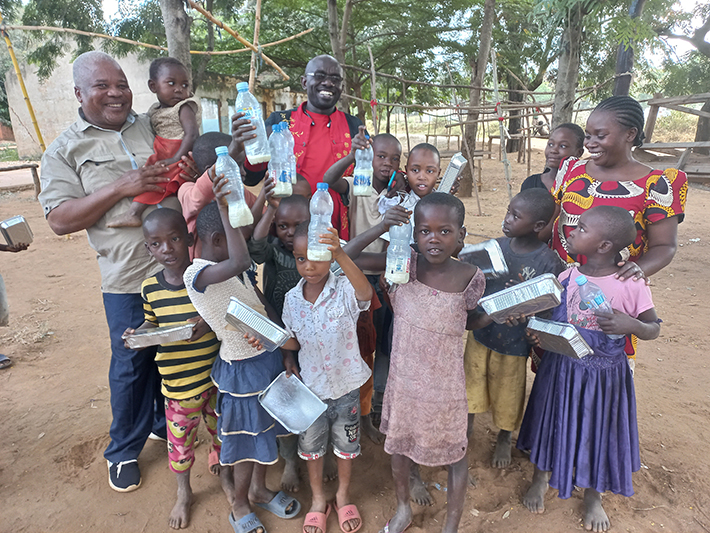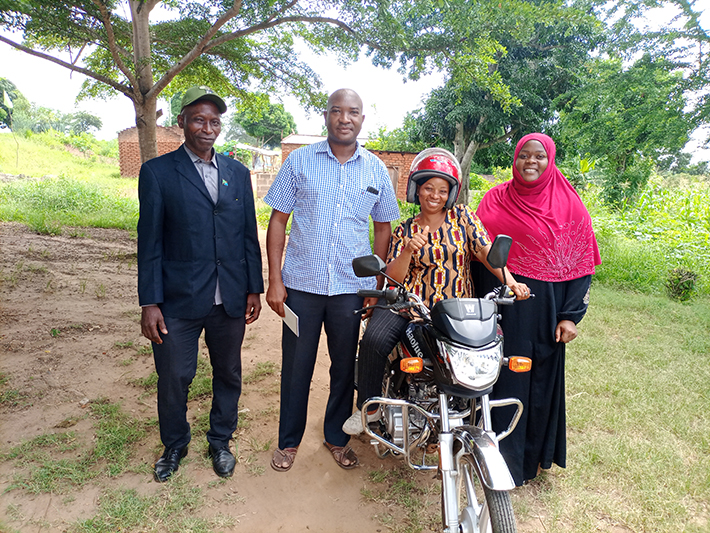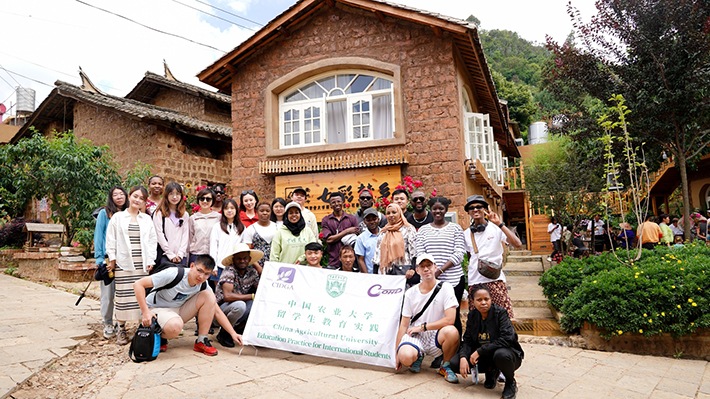|
||||||||||
| Home Nation World Business Opinion Lifestyle ChinAfrica Multimedia Columnists Documents Special Reports |
|
||||||||||
| Home Nation World Business Opinion Lifestyle ChinAfrica Multimedia Columnists Documents Special Reports |
| ChinAfrica |
| Small Steps, Big Benefits |
| Chinese experts have been working for over a decade in Tanzania to fight poverty through accessible agricultural technologies |
| By Li Xiaoyu 丨VOL. 15 March 2023 ·2023-02-23 |

Local authorities and China Agricultural University have taught people how to make soybean milk in a community in the Morogoro Region of Tanzania in May 2022 (COURTESY)
Nasoro Athumani, a 61-year-old farmer in Peapea Village, has become an avid consumer of soybean milk, a traditional Chinese drink that has become increasingly popular among the people in Tanzania’s Morogoro Region.
But Athumani had never heard of soybeans in his life until they were introduced for the first time to his village and three other villages in the region, thanks to a new collaborative project started last year by local authorities and China Agricultural University (CAU).
Indeed, maize is the main staple food in Tanzania. Although the country’s cereals are high in starch, CAU specialists found that they are lacking in protein, notably the important amino acids. They considered using the maize-soybean rotation, a technique that has been widely used in China for a long time, to improve the local nutritional level.
Big benefits of beans
Soybeans provide a number of benefits, says Wu Jin, executive dean of the College of International Development and Global Agriculture at CAU. “Soybean-based foods are a very good plant protein source, an alternative to more expensive animal proteins, providing all nine essential amino acids,” she told ChinAfrica. “This rotation can also assist with the soil regeneration and replenish it with nitrogen without using fertilisers.”
In January 2022, farmers like Athumani received soybeans as part of this programme. Chinese specialists also gave on-site and remote education on plantation and management procedures.
At the end of May last year, the soybean harvest season brought big smiles to the farmers. With a harvest of 400 kg of soybeans from a 0.75-acre (0.3-hectare) plot, Athumani was recognised as the finest soybean farmer in his village. He was handed a soybean milk maker as a reward for this accomplishment. He watched with curiosity as a light-coloured liquid flew from the device. He was awestruck by the beverage after he drank it. “It’s delicious. I certainly didn’t anticipate it!” he said. Given the benefit, he now wants to increase the planting area this year to 2 acres (0.81 hectare).

African students from a master’s programme of China Agricultural University visit a village in Kunming, capital of Yunnan Province, in July 2022 (COURTESY)
Local adaptation
In fact, this is not the first time for the CAU team to work on agricultural cooperation projects in Tanzania. In order to increase maize output and revenue, it has been collaborating with the Morogoro authorities since 2011 on the “Small Technology, Big Harvest” initiative.
Many countries had offered aid in the area before the Chinese team arrived in 2011, but their efforts had not yielded definitive results because their solutions were not tailored to the local conditions. The CAU experts eventually developed the idea of “parallel experience sharing” after interviewing farmers, which entails utilising all available local resources to assist farmers in increasing productivity without having to make significant infrastructure investments.
As a result, the Chinese team in Peapea promoted practical methods including land levelling, proper spacing between rows, higher plantation density, use of better seeds, and two-pass weed control, among others. Even though the methods were straightforward, they were initially not widely adopted; in fact, just one farmer used them in the first year. Due to linguistic and cultural obstacles as well as weather uncertainties, most farmers were highly reluctant to recognise the project’s potential.
After a year, the demonstration fields with maize planted in neat rows and full cob development stood out sharply from the weed-filled fields next to them. As more farmers became convinced of the success of the “small” Chinese technology, they decided to take part in the initiative, which has now grown to include more than 1,000 participants and more than 10 villages in the region. The yields have increased from 4-5 bags per acre to an average of 18 bags.
A farmer from Kitete Village in the Morogoro Region named Fikiri Kisairo joined the initiative in 2019. He is now able to support his family’s daily necessities and his two children’s school expenses thanks to the revenues from his thriving maize harvest.
“One of the great achievements of our project is to revolutionise the knowledge and practices of local farmers about growing maize. At the same time, it helps to fight poverty,” said Wu.

An extension worker in the Morogoro Region has been awarded a motorbike for her outstanding contribution to the promotion of Chinese agricultural techniques on 29 January 2021 (COURTESY)
Exemplary case of collaboration
The structure of cooperation between CAU and its local partners may also explain the shifts in farmers’ attitudes, in addition to the results of Chinese technology in improving productivity. As a stakeholder, the Sokoine University of Agriculture, for instance, facilitated the feasibility study and the monitoring and evaluation of the project. Additionally, Chinese technology has been incorporated into the local government’s agricultural extension system, rewarding exceptional extension agents. CAU has even created a community-based collective activity environment, facilitating mutual learning among households and broad dissemination of new knowledge.
The UN has frequently hailed the “Small Technology, Big Harvest” initiative as a successful example of South-South cooperation. Speaking about this exemplary case of collaboration between developing countries, Jorge Chediek, former director of the UN Office for South-South Cooperation, said, “Small changes can produce extraordinary results. And this experience demonstrates the significance and value of cooperation for the [Global] South, as well as China’s contribution to the growth of Africa and the rest of the world.”
A master’s programme with the same name as the maize project in Tanzania was introduced by CAU in 2019 in the same spirit as “parallel experience sharing.” This programme is available to all African candidates who want to study in China for two years so they may experience the culture there. “We strive to foster African talents who have acquired theoretical knowledge and practical abilities, in order to address numerous issues with agricultural and rural development in their own nations,” Wu noted. The selection of applications has started for the new semester.
| About Us | Contact Us | Advertise with Us | Subscribe |
| Copyright Beijing Review All rights reserved 京ICP备08005356号-5 京公网安备110102005860号 |